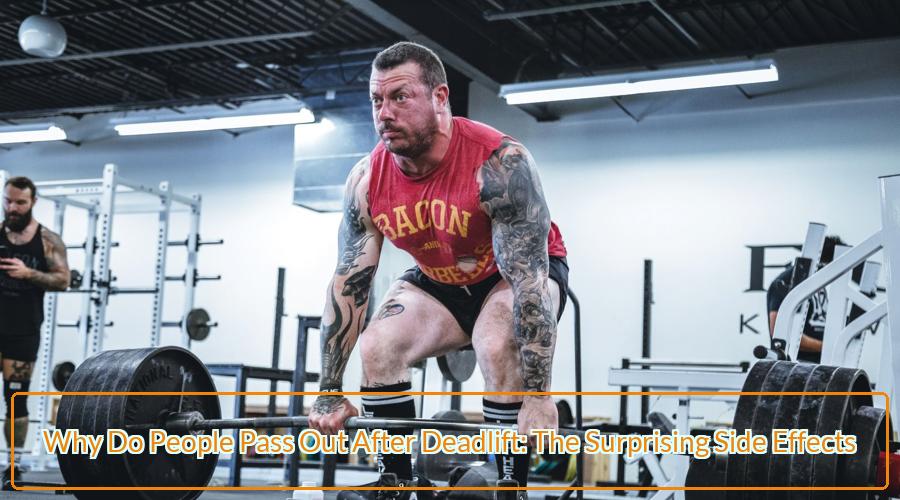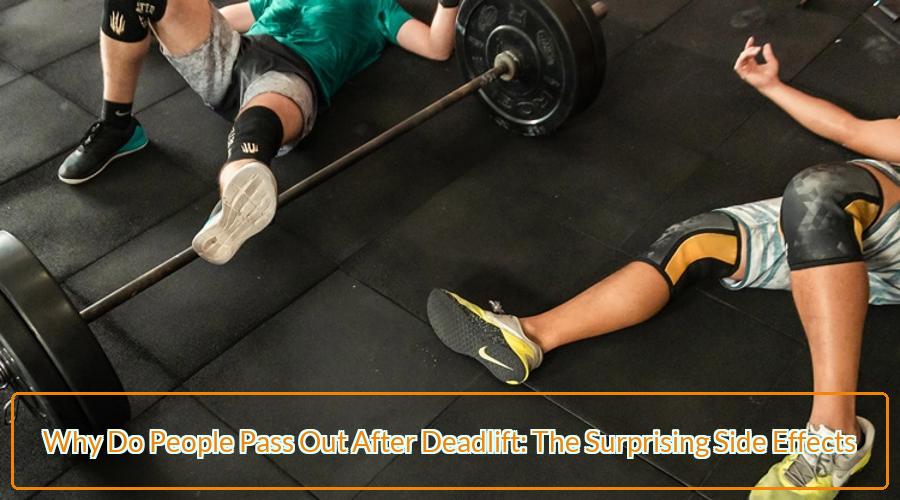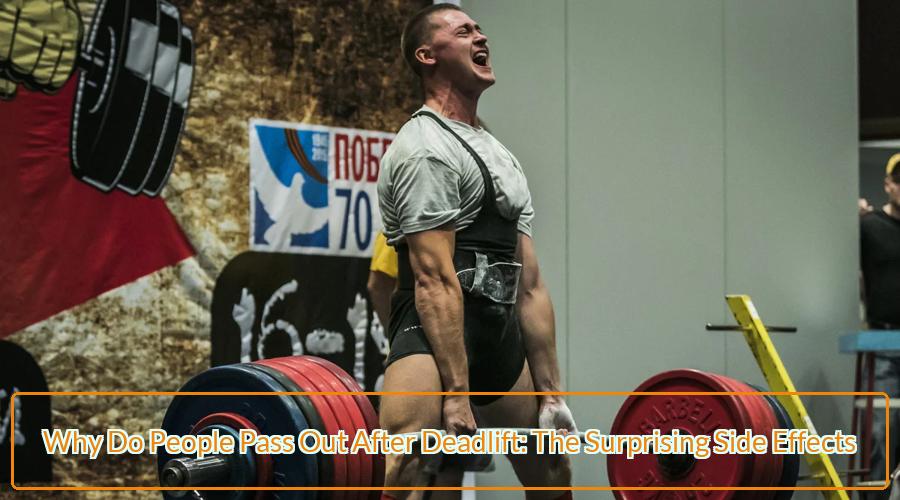
The deadlift is a popular exercise in the fitness world; it works the back, glutes and hamstrings. But what many don’t realize is that this seemingly simple workout can also have some dangerous side effects. One of the most common and concerning? The possibility of passing out after performing a heavy deadlift.
This issue can be caused by several different factors. It’s important to remember that when lifting weights, you are essentially pushing your body to its limits – especially when it comes to heavy deadlifts or any other strength training exercises. This puts intense pressure on your cardiovascular system and can lead to decreased oxygen levels in your brain, resulting in dizziness or fainting.
Uncovering the Reasons Behind Deadlift Fainting
Deadlift fainting, or syncope, is a mysterious medical phenomenon where a person passes out while lifting weights. While usually not fatal, it can be dangerous and uncomfortable for the person experiencing it. Despite its prevalence in weightlifting circles, little research has been done to uncover the true cause of deadlift fainting.
Recent breakthroughs have shed light on this condition by delving into both physiological and psychological factors that may make a person more prone to deadlifting-induced syncope. Research indicates that individuals with certain blood flow irregularities may be more susceptible to passing out due to their decreased ability to regulate blood pressure when lifting heavy weights. Additionally, experts suggest that anxiety about failing at a lift or fear of injury might also play a role in triggering syncopal episodes during deadlifts.
Deadlifts: the Unusual Side Effects
Deadlifts are a popular exercise choice for those looking to build strength and muscle tone. However, few people know that this seemingly simple workout can have some unexpected effects on the body. Beyond increased strength and improved endurance, deadlifts can also offer unusual side effects that may surprise you.
One of the most unexpected side effects of deadlifting is an increase in circulating hormones in the body. Studies have found that regular weight lifting stimulates the production of testosterone, growth hormone and IGF-1 – all of which play a role in building muscle mass as well as controlling fat levels throughout the body.
Additionally, regular deadlifting will help boost your metabolism which can aid with weight loss or maintenance efforts over time. Finally, working out with heavy weights can help improve flexibility and mobility due to increased range of motion experienced when performing certain exercises such as squats or bent rows.
A Surprise Reaction to Big Lifts
Weightlifting is a popular form of exercise, with many people now finding that it can be a great way to stay fit and strong. However, one thing that many lifters don’t expect is the surprise reaction their bodies may have when they start doing big lifts.

When doing heavy lifting, the body goes into what’s known as “fight or flight” mode, sending hormones such as adrenaline and cortisol rushing through your system. This can lead to an increase in heart rate, blood pressure and respiration – all of which are key indicators of how hard you’re working out. As well as this physical reaction, there can also be some unexpected mental reactions too.
Uncover the Cause Behind Deadlift Fainting
Fainting while deadlifting can be concerning and frustrating for weightlifters, especially if the cause is unknown. The good news is that there are a few common reasons behind this potentially dangerous symptom.
To help you uncover the cause of your fainting, it’s important to first consider a few key factors like diet and hydration levels, recent medical history, and training intensity. With a little detective work and guidance from a qualified health professional, you can get to the bottom of why you’re fainting while deadlifting – so that you can stay safe and make progress in your workouts.
The Link Between Deadlifting and Fainting
Deadlifts are a common strength-training exercise for many bodybuilders and athletes worldwide, but the exercise has recently been linked to an increase in fainting. It’s important for anyone who regularly deadlifts to be aware of the risk to their safety.

Fainting is a result of a decrease in oxygen reaching the brain, which can happen when lifting too much weight quickly during a deadlift. The muscles used during a deadlift require more oxygen than normal, leading to an increase in blood pressure and heart rate which can cause fainting. Additionally, straining while holding your breath at the end of each lift increases intra-abdominal pressure, making it harder for your heart to pump oxygenated blood throughout your body.
Unraveling the Mystery of Passing Out After Lifting
Passing out after lifting weights is a relatively rare phenomenon, but it’s important to understand the causes and take precautions to prevent it. This condition, also known as syncope, can be caused by many factors such as dehydration or overexertion. It is important to take the necessary steps during your workout routine to reduce the risk of passing out while lifting weights.
Syncope typically occurs when there isn’t enough blood and oxygen getting through to the brain, resulting in fainting spells. For this reason, proper hydration before and during workouts is essential for preventing syncope from occurring. Additionally, you should make sure you are taking regular breaks throughout your workouts and that you are not pushing too hard past your limits. If you feel lightheaded or dizzy during a workout session, stop immediately and rest until any symptoms subside.
Heavy Deadlifts Can Lead to Fainting
When it comes to weightlifting, deadlifts are one of the most popular and effective workouts for building muscle. However, heavy deadlifts can lead to fainting if not done correctly. Fainting is a sudden loss of consciousness due to a decreased blood flow in the brain and can be caused by physical strain or emotional shock. People undertaking heavy deadlifts should take certain precautions as this exercise poses certain risks.

Deadlifts can cause fainting due to an increase in blood pressure when lifting heavier weights that exceed the body’s capacity. When lifting heavy weights like in deadlifting, too much pressure is put on your body which makes it difficult to maintain blood pressure levels. To prevent fainting, people should ensure they are doing proper warm-ups before beginning their workout session and focus on proper form when lifting heavier weights.
What are the possible causes of passing out after a deadlift?
Passing out after a deadlift is a very serious event and should be taken seriously. Understanding the underlying causes of passing out can help not only determine why it occurred in the first place, but also help to prevent it from happening again. In this article, we will explore some of the potential causes of passing out after a deadlift, including dehydration, hypoglycemia, and low blood pressure.
What are the warning signs that someone may be about to pass out after deadlifting?
Weight training is an important part of a healthy lifestyle, and deadlifting is one of the best ways to build strength and improve overall fitness. However, it is important to be aware of the potential risks associated with deadlifting, such as the possibility of fainting or passing out. This article will discuss the warning signs that someone may be about to pass out after deadlifting, as well as what steps should be taken in order to prevent it from happening.
What are the risks of passing out during the deadlift?
Deadlifting is an effective way to build strength and increase power, but it is important to understand the risks associated with this type of exercise. One of the most serious risks is passing out during a deadlift. When done incorrectly, or when proper safety protocol is not followed, passing out during a deadlift can have serious consequences for your health and well-being.